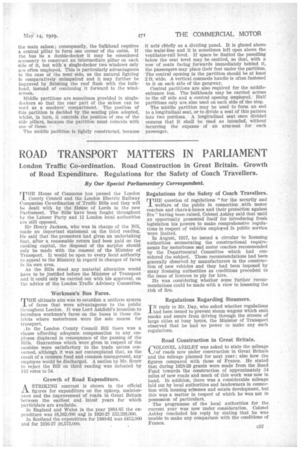ROAD TRANSPORT MATTERS IN PARLIAMENT
Page 67

If you've noticed an error in this article please click here to report it so we can fix it.
London Traffic Co-ordination. Road Construction in Great Britain. Growth of Road Expenditure. Regulations for the Safety of Coach Travellers.
By Our Special Parliamentary Correspondent.
ruHE House of Commons has passed the London 1. County Council and the London Electric Railway Companies Co-ordination of Traffic I3ills and they will be dealt with by the House of Lords in the new Parliament. The Bills have been fought throughout by the Labour Party and 11 London local authorities are still opposed.
Sir Henry Jackson, who was in charge of the Bill, made an important statement on the third reading. He said that the promoters had given an undertaking that, after a reasonable return had been paid on the ranking capital, the disposal of the surplus should only be made with the consent of the Minister of Transport. It would be open to every local authority to appeal to the Ministry in regard to changes of fares in its own area.
As the Bills stood any material alteration would have to be justified before the Minister of Transport and it could only he carried out with his approval, on the advice of the London Traffic Advisory Committee.
Workmen's Bus Fares.
THE ultimate aim was to establish a uniform system of fares that were advantageous to the public throughout London. It was Lord Ashfield's intention to introduce workmen's fares on the buses in those districts where motorbuses were the sole means for transport.
In the London County Council Bill there was a clause affording adequate compensation to any employee displaced in consequence of the passing of the Bills. Guarantees which were given in respect of the combine were satisfactory to the trade unions concerned, although it was not contemplated that, as the result of a common fund and common management, any • employee would be discharged. A motion by Mr. Scurr to reject the Bill on third reading was defeated by 145 votes to 54.
Growth of Road Expenditure.
A STRIKING contrast is shown in the official I1 figures for expenditure on the upkeep, maintenance and the improvement of roads in Great Britain between the earliest and latest years for which particulars are available.
In England and Wales in the year 1884-85 the expenditure was 18,262,000 an‘l in 1926-27 152,238,000.
In Scotland the expenditure for 1880-81 was 1412,000 and for 1926-27 16,373,000.
Regulations for the Safety of Coach Travellers.
THE question of regulations "for the security and welfare of the public in connection with motor coaches and chars-a-banes and their protection against fire" having been raised, Colonel Ashley said that until an opportunity presented itself for introducing fresh legislation his powers to make comprehensive regulations in respect of vehicles employed in public service
were limited. "
In August, 1927, he issued a circular to licensing authorities enumerating the constructional requirements for motorbuses and motor coaches recommended by the Departmental Committee which had considered the subject. Those recommendations had been generally observed by manufacturers in the construction of new vehicles and they had been imposed by many licensing authorities as conditions precedent to the issue of licences to ply for hire.
He was considering whether some further recommendations could be made with a view to lessening the risk of fire.
Regulations Regarding Steamers.
IN reply to Mr. Day, who asked whether regulations had been issued to prevent steam wagons which emit smoke and smuts from driving through the streets of large cities at busy hours, the Minister of Transport observed that he had no power to make any such regulations.
Road Construction in Great Britain.
COLONEL ASHLEY was asked to state the mileage of roads now under construction in Great Britain and the mileage planned for next year ; also how the figures compared with those of France. He stated that during 1928-29 grants were made from the Road Fund towards the construction of approximately 54 miles of new roads and much of this work was now in hand. In addition, there was a considerable mileage laid out by local authorities and landowners in connection with housing schemes and estate development, but this was a matter in respect of which he was not in possession of particulars.
The programme of the local authorities for the current year was now under consideration. Colonel Ashley concluded his reply by stating that he was unable to make any comparison with the conditions of France.




























































































































